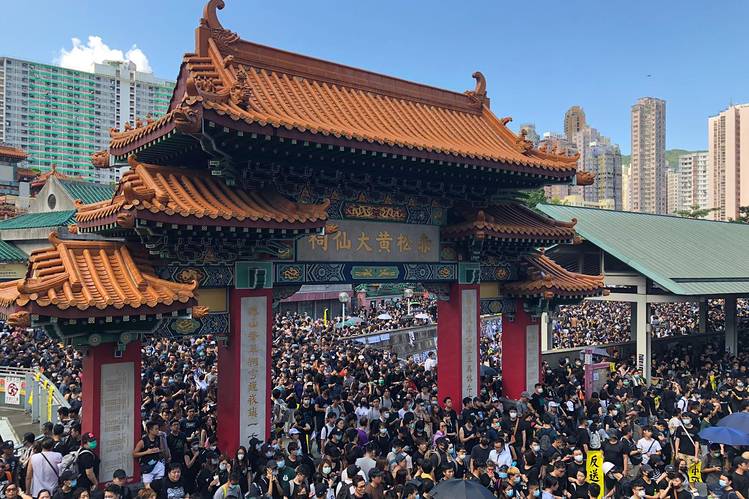- January 23, 2021
- Posted by: Disha Malhotra
- Category: Featured, GLOBAL GOVERNANCE & POLITICS, INTERNATIONAL AFFAIRS, Latest Work

When Hong Kong was handed over to China under the framework of “One country, two systems”, in 1997 by Britain, it was agreed that Hong Kong would be organized by a series of colonial decrees and administered under the context of Special Administrative Region (SAR). The colonial-era drafters had ensured that Hong Kong people would enjoy a high degree of political and social autonomy in their affairs which includes impartial courts and freedom of speech. In May 2020, while the entire world was reeling under twin shocks of Covid-19 and the economic slump, China very adeptly exploited the opportunity to unleash a reign of terror by passing a draconian national security law by the Beijing rubber-stamp parliament. The shock came in May when the Communist Party decided to impose a sweeping national security law on the territory. Anxieties about the bill triggered massive pro-democracy protests all across the island nation and demanded a restoration of the political and social autonomy of the Hong Kongers. The protest was a rallying cry for millions of people who saw this development as the burial of China’s promise to guarantee “one country, two systems”. China was committed to rule by fear, and for the liberal society, the entire institution was under assault.
Last year, in June 2019, China tried to impose the Extradition bill sweepingly. The bill’s provisions state that it would authorize Hong Kong to extradite crime suspects to mainland China for trial. What started as a series of peaceful protests across the island resulted in a tumultuous battle of interests. Last year’s protests had demonstrated the impeccable ability of the Hong Kongers to organize and innovate themselves as one unit. The protests erupted demanding the resignation of the Chief Executive Officer, Mrs Carrie Lam, and inquiry into the aggressive use of police brutality, the release of the arrested protesters, and the preservation of political and social autonomy of the Hong Kongers.
Hong Kong has very skillfully managed to cement its position in the middle and has raised the stakes for the Asian markets to become the 3rd most important financial centre after New York and London. However, with China’s presence in the backyard and subject to an all-seeing intrusive communist party surveillance, Hong Kong’s financial institutions have seen a gradual decay. They have been forced to integrate into mainland China before its expiration date.
The National Security bill has completely dismantled Hong Kong’s notion being run according to a framework of “one country, two systems”. The idea behind the framework of “one country, two nations” was to instil a sense of solace among the Hong Kongers that unification and integration into the Mainland would not lead to losing their autonomy and identity. The law allows China to send secret agents in Hong-Kong to impose the law as they please, subject to high invasive surveillance for maintaining a high degree of discipline and order. Its spies will not be subject to the local law. The bill’s provisions state that most of the security-laws cases will be tried in the Hong-Kong courts only. But the judges will be government-appointed. However, the most distressing part of this law is that serious crimes would be tried in the Mainland, which reflects how the role of an independent judiciary in Hong Kong has been subverted. The bill’s definition of sedition, terrorism, and subversion could be applied to even the petty, non-violent activities. This law could be invoked on anyone who would undermine Chinese communist interests’ ideals under the garb of “unlawful activity”.
Despite the omnipresence of police agents who are extremely loyal to the Communist Party and their aggressive use of tear gas and rubber bullets to subside the protests, Hong Kong’s people stand in solidary. Since the announcement of the crackdown and the subsequent events that followed, Hong Kong people, especially the students, human rights activists, lawyers, and the youth have been the face of these protests. The civil societies have also demonstrated exemplary gritty performance by maintaining an iron-fisted position and sending across a noisy message that civil societies’ role is indispensable to ensure the healthy working of a democracy. “United we stand, Divided we fall”, has been the motto of the Hong Kongers. All they demand is a secure institutional environment, the right to elect their representatives and be subjected to the rule of law. Their mammoth appetite to enjoy dignity under being human beings and safeguarding their right to freedom of expression thought and action is all they desire. However, China remains fundamentally hostile to all these ideas of Western ideology. Anything that comes in the way of the Communist Party is viewed with an evil eye and shrugged away.
The world is entitled to be shocked by such developments, but it is not surprising. In the past, China has demonstrated its extraordinary potential to crush the Tiananmen protests in 1979. The Party’s objectives reflect its determination to muzzle the opposition voices and dismantle ideas that are inconsistent with communist thinking. The story of Hong Kong is a lesson for the world as it has sent jitters worldwide. The anger is against the imposition of National Security Law and all the more directed towards the despotic government, which has very systematically ignored the will of the people. The rest of the world should stand up for China’s bullying. China views human rights and the hallmarks of western ideals as an existential threat; any flicker of dissent must be snuffed out fast, least it is spread. Xi Jinping’s appetite to control every aspect of life and its coercive exercise of power to tighten its grip beyond the Mainland has wreaked havoc.
China’s long-standing desire to build an island fortress across the South China sea, unleashing a culture of terror, horrific stories about human rights violations in Xinjiang of the Uyghurs Muslims, China’s geostrategic vision to exploit the poorer nations by exerting bilateral influence by providing them unsustainable levels of debt, China’s ambitious trillion-dollar Belt Road Initiative by rerouting the entire world trade in an attempt to build massive infrastructure projects in 60 nations which snakes away from Eurasian heartland into South Pacific and West Africa, Xi Jinping’s autocratic prowess and his Party’s determination to tighten the grip, all these instances have clearly illustrated China’s desire to become a colossal hegemony. It will stop at nothing even if it has to breach international laws and crush dissent at the cost of its global reputation.
REFERENCES
- (The Hong Kong Crisis and the New World Order – BBC News, n.d.)
- (Hong Kong’s Blueprint Changed Protests Around the World – The Diplomat, n.d.)
- (China Plans Further Hong Kong Crackdown after Mass Arrest: Report | Hong Kong Protests News | Al Jazeera, n.d.)
- (Hong Kong: End of the Global City? | ORF, n.d.)
- (How China′s Influence Is Changing Hong Kong Protests | Asia| An In-Depth Look at News from across the Continent | DW | 07.09.2020, n.d.)
- (Reshaping of Hong Kong Follows 2019’s Pro-Democracy Protests | Voice of America – English, n.d.)

